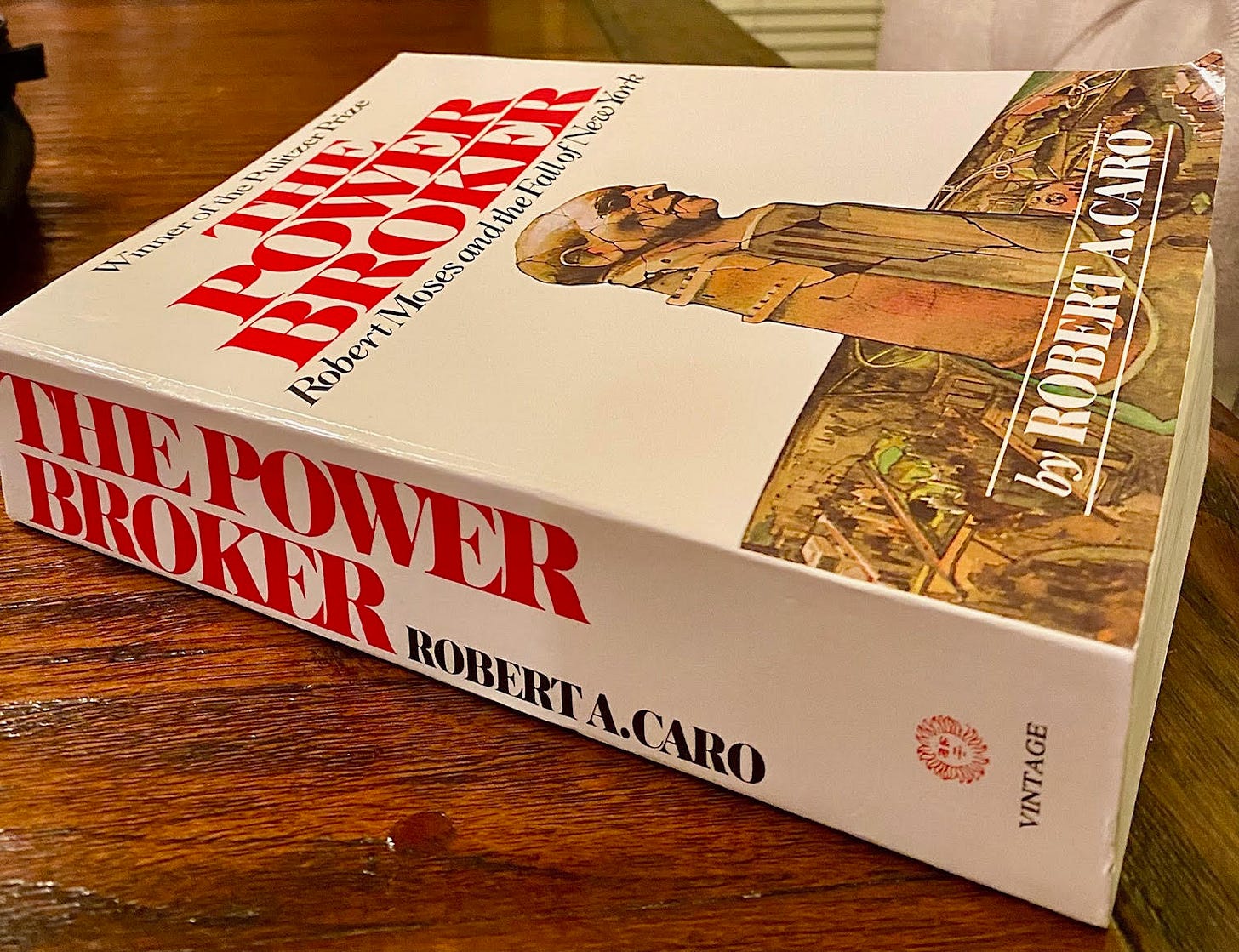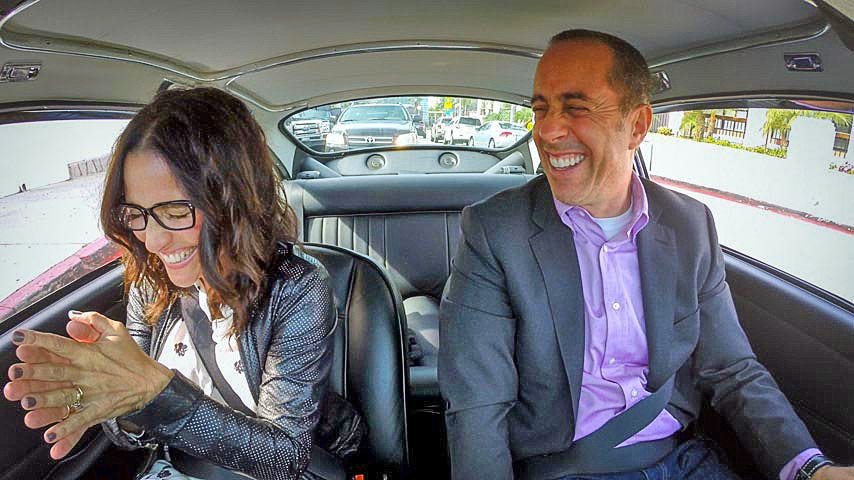'You have to always have something to look forward to'
Learning from Robert Moses, Jerry Seinfeld + Julia Louis-Dreyfus
Lately, I’ve been reading Robert Caro’s magnificent 1974 biography of Robert Moses, The Power Broker. For years — decades, actually — Moses served as New York City’s Parks Commissioner, an anodyne title that belied the actual power he held to shape the city’s landscape, and to a very large extent the lives of the millions of people who live there.
It’s unlike any other biography I’ve ever read, even the ones I’ve loved, like Doris Kearns Goodwin’s Team of Rivals on Abraham Lincoln or Sarah Bakewell’s How to Live, on the life of the legendary French essayist Montaigne (which I wrote to you about not too long ago).
I don’t know if it’s the incredible level of detail Caro brings us about Moses’s life and career — the range of people he spoke with, from his family members to people who had only a passing familiarity with him from his days in high school, is just astounding — or if it’s the way he synthesizes all the events from his life, and the era in which he lived.
But it’s all just completely mesmerizing and masterful; it even almost reads a bit like a suspense novel, as Moses experiences a number of cliffhanger-like moments in the first decade or so of his career in New York City government, when everything could have gone completely differently and we’d never have heard of him.
Something struck me early on in the book about Moses, the kind of person he was and the desire and ambition he possessed — traits which ultimately prove to be his undoing, as his ambition curdles into arrogance and hubris, things we learn as the book progresses. But in the early chapters, when we’re witnessing Moses still in his mid- to late-twenties, he hasn’t yet hit those stretches of his life, so his vision for the future is still an inspiring, hopeful one.
I was particularly taken by the scenes Caro paints of how Moses would spend his afternoons in the city, when — whatever he had to do for the day was done — he would take a taxi uptown, where’d he’d get out and just walk block after block, envisioning in his imagination what these parts of New York City — which, at the time, were a tangle of railroad tracks and swamp-like bottom land, dotted with garbage dumps and “tar-paper shanty towns considered so dangerous the police stayed away from them” — could be like one day:
In the late afternoons, as the sun sank toward the Palisades across the Hudson, Bob Moses walked along Riverside Drive. He walked down the steep paths to the park, over one of the bridges across the tracks and, skirting the dirty tar-paper shacks, along the edge of the clean blue river. And as he walked, he dreamed. One Sunday in 1914, he was crossing the Hudson by ferry to picnic in New Jersey. With him were some college friends and their dates, one of whom was Frances Perkins, later to be United States Secretary of Labor. As the ferry pulled into the river, Moses leaned on the rail, watching Manhattan spread out behind the boat. Miss Perkins happened to be standing beside him and suddenly she heard Moses exclaim, “Isn’t this a temptation to you? Couldn’t this waterfront be the most beautiful thing in the world?” As the woman looked at him in astonishment, words began to pour out of Bob Moses and she realized that “he had it all figured out. How you could build a great highway that went uptown along the water. How you’d have to tear down a few buildings at Seventy-second Street and bring the highway around a curve… He wanted places where people could leave their boats safely, public clubs… like private clubs.” Staring back at the bleak mud flats covered by a haze of smoke from the railroad engines, she heard Moses paint for her a picture of what the scene could be like on a Sunday — the ugly tracks completely hidden by the great highway, cars traveling slowly along it, their occupants enjoying the view, and along the highway stretching green parks filled with strollers, tennis players and families on bicycles. There would be sailboats on the river and motor yachts tied up in gracefully curving basins. And the thing that astonished her most, Miss Perkins was to recall, was that Bob Moses had the exact location of tennis courts and boat basins quite definitely in mind; the young Bureau staffer beside her was talking about a public improvement on a scale almost without precedent in turn-of-the-century urban America, an improvement that would solve a problem that had baffled successive city administrations for years. And “he had it all figured out.”
What gets me about this scene is, let’s consider the moment Caro is writing about: we’re within weeks of the start of the First World War, a time when the optimism of the Progressive Era in the U.S. was beginning to wane, and a newer, darker outlook would take hold. And yet here is Moses, walking around a part of New York City clearly mired in poverty and squalor, and with essentially all of the political forces in the city aligned against the changes he wants to make — and yet, he believes with absolute conviction that he is going to bring into being the future he can see so clearly in his mind. It’s not even a question of whether; merely how and when.
Now, I know there’s much more to Moses’s story. Much, much more, in fact. (I haven’t even finished the book yet, but I know how it ends thanks to the wonderful documentary Turn Every Page from a couple of years ago.) But still — there is something extraordinary and inspiring about that moment Moses shared with Frances Perry, walking along Riverside Drive, something that feels so alien to the time we live in. And yet, there’s nothing stopping any of us from embracing that kind of optimism, is there?
This may sound (incredibly!) silly, but for me that moment in The Power Broker reminded me of this scene in Jerry Seinfeld’s Netflix series Comedians in Cars Getting Coffee, when he interviews his old Seinfeld castmate Julia Louis-Dreyfus, and they reminisce about all the laughs they had making the show together.
I can’t say it any better than Jerry and Julia did, so I’ll let them take it from here:
Julia: “Here’s something that my mom says to me and I think it’s very true, in terms of happiness. You have to always have something to look forward to. And it can be a very minor thing, it can be a major thing. But you always have to have something you’re looking forward to next.
Jerry: “Well what are you looking forward to right now?”
Julia: “Getting the hell out of this car.” [Laughs hysterically]
Jerry: “Oh, that was a heavy peach. That was a heavy peach and she picked it.”
That’s what I’ll leave you with today, because I just love this scene — I love the relationship between Jerry and Julia, and the laughs they share, and just everything about it. I hope you and I can have some laughs like this one day too!
As always, keep in touch and let me know what’s new with your running/life.
Your friend,
— Terrell





There's an older (perhaps ancient) couple where I live who decorate their house on every holiday--major, minor and the totally obscure. I've often thought that's their way of always having something to look forward to...and it reminds me that our lives can get small as we age...and it's soooo important to not let ourselves diminish with time. We must always have "something to look forward to." Per usual, T, a great and provocative post.
I’ve had The Power Broker sitting on my shelves for a few years, but it’s been intimidating to actually pick up. The 99% Invisible podcast (https://99percentinvisible.org/club/) is doing a book club this year discussing the book, which I want to listen to. Just have to start reading first….